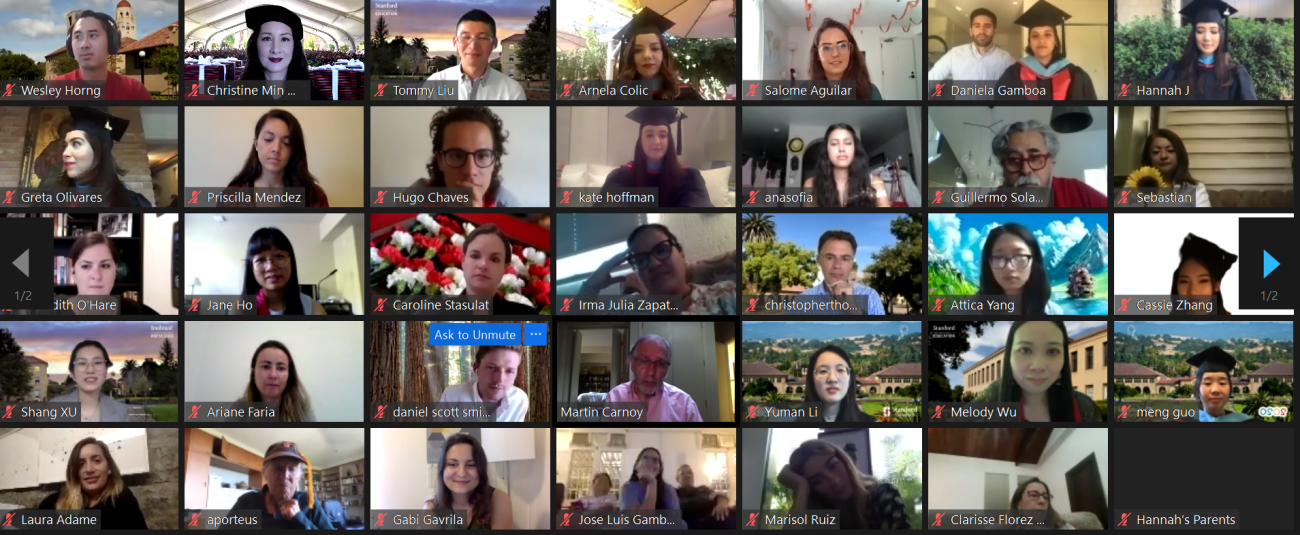Stanford invested in you because you will make a difference in the greatest undertaking of humanity – educating all its children to be the best they can be.

During graduation celebrations, Stanford education students praised for their commitment to improve learning for all
In virtual celebrations honoring the 2020 graduates of Stanford Graduate School of Education, faculty recognized the extraordinary efforts of their students during an uncertain time and praised their commitment to serve society through teaching, discovery, and innovation.
Over several days from June 12-18, the GSE held separate online meetings and webinars celebrating graduates of its master's, PhD, and undergraduate programs.
Many faculty donned caps and gowns to bring some of the pomp and circumstance of a traditional commencement into the virtual space. Still, the ceremonies were not a replacement for an in-person celebration that all graduates will be invited to attend at Stanford when it's allowed.
"This is an extraordinary time in which you are graduating," said GSE Dean Dan Schwartz in a video address, referring to the novel coronavirus and the renewed conversations and rallies around racial injustice that have defined the spring quarter. "Within all of this, I do think it's important to recognize your achievements."
Schwartz said the ceremonies are a "celebration of hard work, accomplishment, vision, and a commitment to high values and standards."
The GSE conferred 26 doctoral degrees and 163 master's degrees in programs ranging from teacher preparation and international education to policy and leadership studies, as well as joint degrees with law, business and public administration. Twenty-three Stanford undergraduates also were recognized for completing a minor or honor's thesis.
While held from a distance, in some ways the virtual ceremonies offered an opportunity for more personalized festivities. During the PhD celebration, faculty advisors spoke for several minutes each about their students and the education challenges they tackled through their research.
During the ceremony for Global and Comparative Education/International Educational Policy Analysis, program director Christine Min Wotipka, an associate professor, identified the distinct ways each of her students taught her something or contributed to the nurturing of community in the program. Students also had a chance to reflect on their experience.
"This innovation of having our graduate ceremonies online has some advantages," said Karin Forssell, director of the Learning, Design and Technology master's program, where students also shared gratitude and memories.
At the ceremony for graduates of the Stanford Teacher Education Program (STEP), program directors and staff personally saluted graduates, played videos and slideshows looking back at the year, and provided words of encouragement as their students set off to classrooms in schools disrupted by the COVID-19 pandemic.
"We appreciate your bravery and your caring," said Peter Williamson, associate professor and director of the STEP secondary program. "Together we have puzzled through what it means to be an educator in an imperfect world. You're embarking on a journey of making the future possible for children and communities everywhere."
The coronavirus has wreaked havoc in all areas of the economy and society but has been particularly disruptive for education. Stanford students preparing to be teachers not only saw their own classes move online but those of their students in kindergarten through 12th grade. Instead of splitting their time off-campus in school placements, the Stanford students taught remotely too – trying to maintain relationships with their students and classroom teachers.
"These are hard times to be a teacher, and an especially urgent time to be a teacher," said Ira Lit, associate professor and director of the elementary STEP program. "Students need you, families and communities need you, the profession needs you, the world needs you."
Themes of equity, justice and pursuing more effective solutions ran throughout each ceremony reflecting the responsibility many GSE graduates feel to use their degrees to improve the world, and the faculty commitment to help them along the way.
The global pandemic certainly shifted how and where these students completed their dissertations and coursework – and in some cases prompted new projects – but it did not impact the students' resolve to keep going and finish their studies. That perseverance was noted time and again.
"This year you all have proven your absolute tenacity and persistence," Shelley Goldman, professor emerita and associate dean of faculty and students, told PhD graduates.
The graduation celebrations also included the Student Guild Awards, recognizing outstanding faculty, students and staff. New this year were technology innovation awards, spotlighting exceptional efforts made by the GSE community to bring courses online due to the pandemic.
Students were reminded across ceremonies that their learning and creativity have prepared them to meet this moment.
"You are highly talented, well educated, driven, and caring. Do not forget why you got a degree in education – you want to help people," said Schwartz. "This motivation will reassert itself over and over, no matter what path you follow. Stanford invested in you because you will make a difference in the greatest undertaking of humanity – educating all its children to be the best they can be."
Faculty mentioned in this article: Christine Min Wotipka



